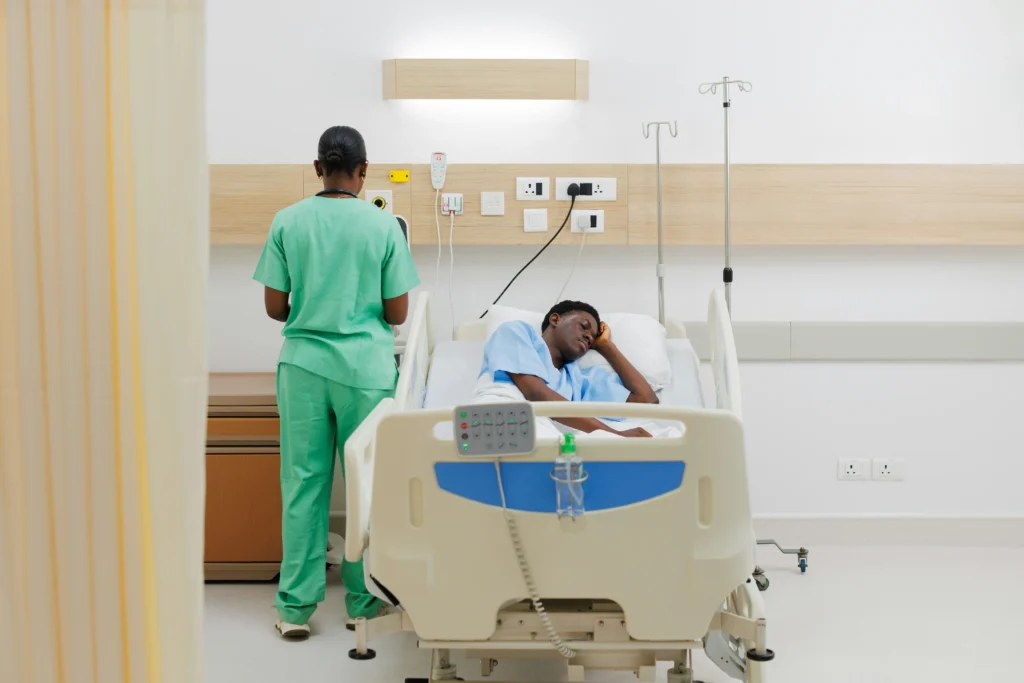
795,000 Americans die or are permanently disabled each year from diagnostic errors alone. When hospitals fail to provide proper care, patients and families often suffer life-changing consequences. Whether it’s a misdiagnosis, a surgical error, or a preventable infection, victims may be entitled to legal action with the help of lawyers for negligence in hospitals.
In Illinois, these cases can be complex, requiring attorneys who understand both the medical and legal aspects of negligence. At IllinoisLawyers.com, we’ve been helping people since 2001 connect with trusted medical malpractice attorneys across Illinois. We provide FREE and confidential referrals to experienced lawyers, ensuring families don’t have to navigate these cases alone.
What Is Hospital Negligence?
Hospital negligence happens when medical professionals or facilities fail to deliver the accepted standard of care, resulting in harm. Unlike a simple mistake, negligence is preventable and rooted in carelessness, lack of training, or poor oversight. Common examples include:
- Surgical mistakes (wrong-site surgeries, instruments left inside patients).
- Medication errors (wrong dose, wrong medication, or drug interactions overlooked).
- Failure to diagnose or delayed diagnosis of serious conditions.
- Improper patient monitoring, especially in ICUs and emergency rooms.
- Birth injuries caused by negligence during labor and delivery.
When errors escalate, the result can be catastrophic. These cases require experienced lawyers who focus on hospital negligence and are capable of conducting thorough investigations and pursuing justice.
Hospital Negligence Resulting in Death
One of the most devastating outcomes is hospital negligence resulting in wrongful death. Families not only endure grief but also face unexpected medical bills, funeral expenses, and the loss of financial support.
In such situations, Illinois law allows surviving family members to file a wrongful death lawsuit. These cases often involve complex medical records and expert testimony. That’s why we connect families with attorneys who focus on in-hospital negligence and have the resources and compassion to handle wrongful death claims.
Who Can Sue for Negligence in Hospitals?

In Illinois, a patient or their surviving family can sue for hospital negligence if they can prove the hospital or its staff’s actions (or inactions) fell below the accepted standard of care, causing measurable harm, such as injuries, added medical expenses, or wrongful death.
Potentially liable parties include the hospital itself for systemic failures, and individual healthcare providers like doctors, nurses, radiologists, and technicians who directly contributed to the harm.
Illinois Statute of Limitations
In Illinois, you usually have two years from the date you discover your injury—or when you reasonably should have discovered it—to file a hospital negligence claim. There’s also a four-year limit from the actual date of the mistake, whichever comes first.
For minors, the law allows more time—up to eight years—to bring a claim. Because these deadlines can be strict and complicated, it’s important to act quickly and speak with an experienced lawyer as soon as you suspect negligence.
And note that if the Federal government is the defendant, it’s a two year time limit no matter your age and there are specific forms that need to be filed.
Why Lawyers for Negligence in Hospitals Are Crucial
Hospitals and their insurers have entire legal teams dedicated to protecting their interests. Without strong representation, families are often outmatched. That’s why working with an experienced medical malpractice attorney matters.
Lawyers that focus on hospital negligence can:
- Identify where hospital staff or administration breached their duty of care.
- Gather expert medical testimony to prove negligence.
- Quantify damages, including medical costs, lost income, and pain and suffering.
- File within Illinois’s strict statute of limitations.
There are a bunch of law firms that say they handle medical malpractice claims, but in reality there are not too many that are elite at it. The right one can be the difference between not just winning or losing, but also millions of dollars.
How to Find the Best Medical Negligence Lawyer
Finding the right lawyer for a hospital negligence or malpractice case isn’t just about choosing someone with a law degree—it’s about finding a legal partner who understands medicine, has trial experience, and truly cares about your outcome. Here’s what to look for:
Proven Experience in Hospital Negligence
The best medical negligence lawyers have handled lawsuits against hospitals, doctors, and large healthcare systems. They understand complex medical records, know which experts to consult, and have a track record of winning meaningful settlements or verdicts.
Strong Reputation and Client Results
Look for attorneys with positive client reviews, peer recognition, and case results that show they’ve successfully handled malpractice claims. At IllinoisLawyers.com, we’ll only recommend a medical malpractice lawyer who meets high standards of trust and performance. We would never refer you to someone that we wouldn’t send a close friend to.
Resources and Medical Experts
Hospital negligence cases often hinge on expert testimony. The best malpractice attorneys have access to respected medical professionals who can explain what went wrong and why it qualifies as negligence.
Willingness to Go to Trial
Hospitals and their insurers often try to settle for less than what victims deserve. A strong medical malpractice attorney is prepared to go to court if that’s what it takes to secure justice. If your law firm does not try cases, they should not represent you.
Compassion and Client Focus
These cases can be deeply emotional. The best lawyers that specialize in hospital negligence don’t just fight hard in court—they also support you through the stress of the legal process.
How IllinoisLawyers.com Can Help You

Since 2001, our mission has been simple: to give people the same advice and referrals we’d give our friends and family. Here’s how we help in hospital negligence cases:
- Free Consultations: You can discuss your case with an experienced Illinois attorney right away at no cost. Call us at (312) 346-5320 or (800) 517-1614 today.
- Tailored Referrals: We carefully choose medical malpractice lawyers in Illinois who fit your case.
- Statewide Network: Whether you’re in Chicago, Springfield, or Rockford, we have vetted attorneys across Illinois.
- Confidential & Honest: Your inquiry is 100% confidential. We never sell your information or pressure you.
- Proven Results: We connect you to medical negligence lawyers who have secured millions for clients harmed by hospital negligence.
Contact Illinois Lawyers today for free legal guidance and referrals to top attorneys.
When you reach out to us, we’ll connect you with an Illinois medical negligence attorney whom we would recommend to our own family.
The Process of Filing a Claim
When you work with one of our referred attorneys, the process often includes:
- Case Evaluation: Reviewing your medical history and records.
- Expert Consultation: Bringing in doctors to confirm negligence.
- Filing the Lawsuit: Within Illinois’s statute of limitations (typically two years).
- Negotiation: Attempting a settlement with the hospital’s insurers.
- Trial: If necessary, fight for your rights in court.
Every step is managed by experienced lawyers, ensuring you don’t have to navigate the legal system alone.
Compensation for Medical Negligence

In Illinois, victims of medical negligence can pursue compensation for their injuries through a medical malpractice lawsuit. There are no caps on damages in Illinois, and the amount of compensation depends on factors like the extent of the injury, the strength of evidence, and the quality of legal representation.
Victims can recover:
- Economic Damages: These cover quantifiable losses, such as medical bills, lost wages, and future medical expenses.
- Non-Economic Damages: These compensate for non-monetary losses such as pain and suffering.
- Wrongful Death Damages: If medical negligence results in a patient’s death, family members can file a lawsuit to recover damages on behalf of the deceased.
Illinois uses a system where a patient can still recover damages even if they are partly at fault, but their percentage of blame will reduce their compensation.
Find the Perfect Lawyer for Your Case
Hospitals should be places of healing, but negligence can turn them into areas of harm. Victims deserve justice—and that begins with choosing the proper legal representation. At IllinoisLawyers.com, we refer you to trusted lawyers for medical negligence who have the skill, compassion, and experience to fight for your rights.
We are aware that numerous directories and advertising platforms are available. But unlike them, we don’t accept payment from lawyers just to be listed. Our referrals are based on merit, experience, and trust. Whether you’re dealing with complications yourself or the tragedy of hospital negligence resulting in the death of a loved one, we’re here to guide you toward the justice and compensation you deserve.



